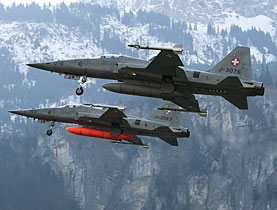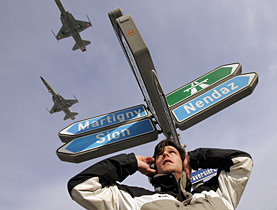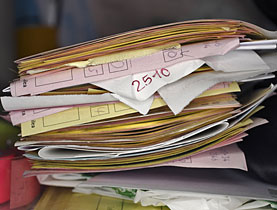Swiss vote on ban on jets and tax breaks

Voters went to the polls on Sunday to decide on a proposal by an environmental group to ban training flights by the Swiss air force over tourist regions.
The electorate also had the final say on proposed tax breaks for small and medium-sized enterprises (SMEs). The centre-left challenged a parliamentary decision in a nationwide ballot.
First results are expected shortly. The fiscal reform is likely to win a majority, while the proposal to ban training flights is set to be rejected, according to observers.
Opponents of the tax break argue the reform will result in a shortfall in revenue for social security schemes because it offers shareholders a reduction in tax on dividends and goes against the principle of fairness.
“It encourages companies to pay out higher dividends instead of increasing employees’ salaries,” said Hans-Jürg Fehr of the Social Democratic party.
Others, including the Green Party and the trade unions, point out that only a limited number of well-off people stand to benefit from the tax breaks.
They have threatened to take their case to the Federal Court, Switzerland’s highest instance.
Appeals have already been lodged against similar overhauls of the tax system in two of Switzerland’s 26 cantons. Under the country’s three-tier fiscal policy, cantons also levy taxes on businesses and individuals.
Administrative burden
The main centre-right parties as well as the government and the business community say the fiscal reform will give a boost to the economy by encouraging investments and creating jobs.
Supporters of the reform argue that SMEs – which form the backbone of the Swiss economy – stand to benefit from a set of planned measures aimed at reducing the financial and administrative burden for companies.
Gerold Bührer, president of the Swiss Business Federation (economiesuisse), says Switzerland is one of the last industrialised countries to impose a tax on company profits and on dividends at the same time.
He also hinted at putting forward plans to call for cuts in tax rates on profits.
A nationwide opinion poll carried out at the beginning of the month gave supporters of the reform a 15 per cent point lead over their opponents.
Noise pollution
The survey found an even larger majority rejecting a people’s initiative, launched by a leading environmentalist, Franz Weber.
His organisation, Helvetia Nostra (Our Switzerland), calls for the banning of all military exercises using fighter jets over tourist areas, mostly in alpine regions, in peacetime.
The noise of military aircraft has an adverse impact on humans and animals and is damaging to the environment, economy and tourism, according to the group.
Opponents of the initiative, including the government and centre-right and rightwing parties, have dismissed the proposal as an attack against the country’s sovereignty. They said it was incompatible with national security objectives.
The Swiss air force fleet, which includes 118 F/A-18 Hornet and Tiger jets, has been revamped and the number of airbases was reduced over the past few years.
swissinfo, Urs Geiser

More
People’s initiative
Corporate tax for holding companies came into force ten years ago.
In 2004 voters turned down a proposed tax package of tax cuts for families, property owners and shareholders.
Under Switzerland’s three-tier tax system, the federal, cantonal and local authorities levy taxes on individuals and businesses. The highest proportion goes to the cantonal authorities.
Sunday’s ballot was the first nationwide vote in Switzerland in 2008.
About 4.9 million citizens aged 18 or over were eligible to vote.
Turnout is expected to be slightly below average in the nationwide ballots.
Polls also took place in several cantons and communes on a variety of issues.
Votes usually take place on four Sundays during the year.

In compliance with the JTI standards
More: SWI swissinfo.ch certified by the Journalism Trust Initiative



You can find an overview of ongoing debates with our journalists here. Please join us!
If you want to start a conversation about a topic raised in this article or want to report factual errors, email us at english@swissinfo.ch.